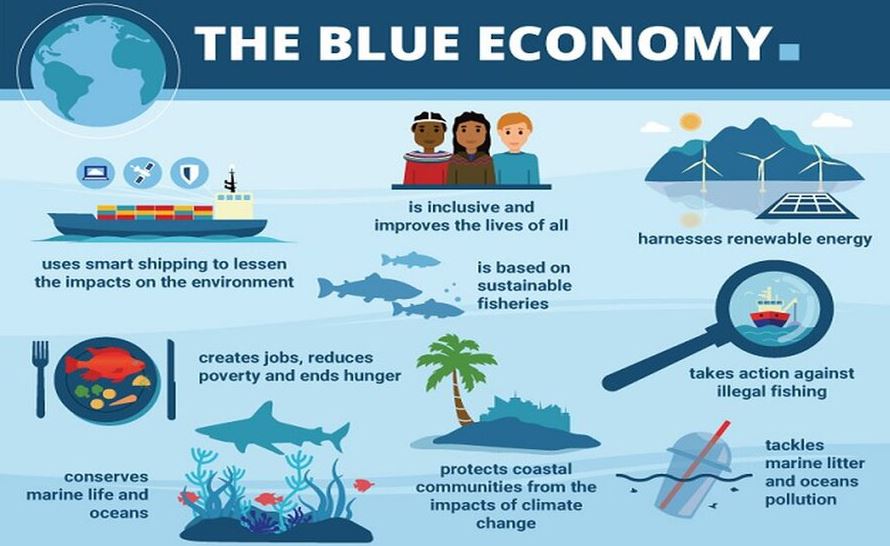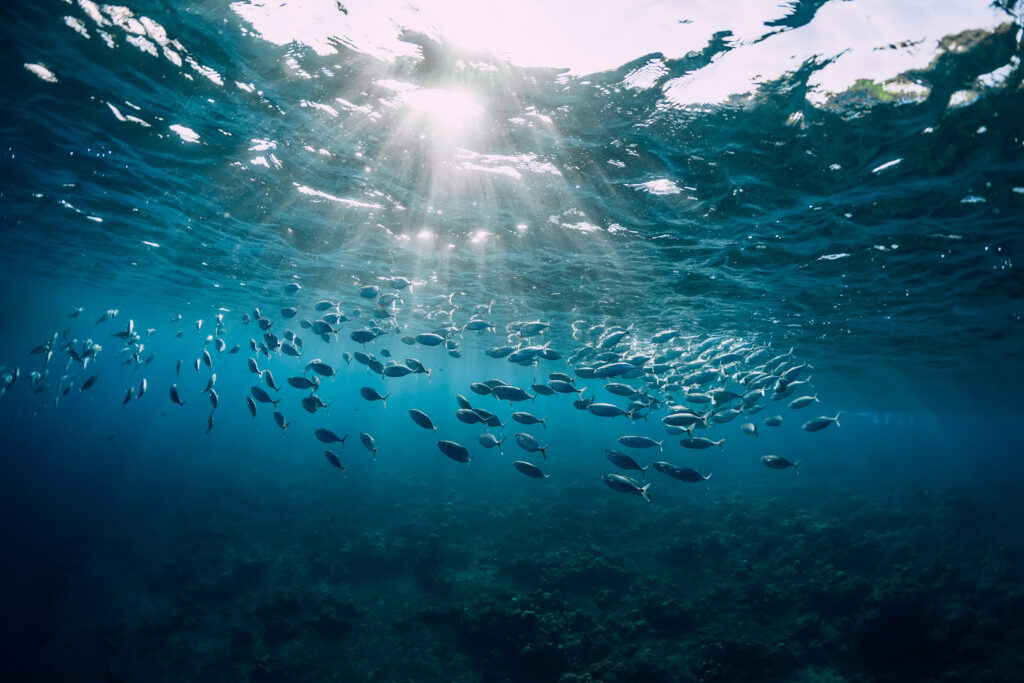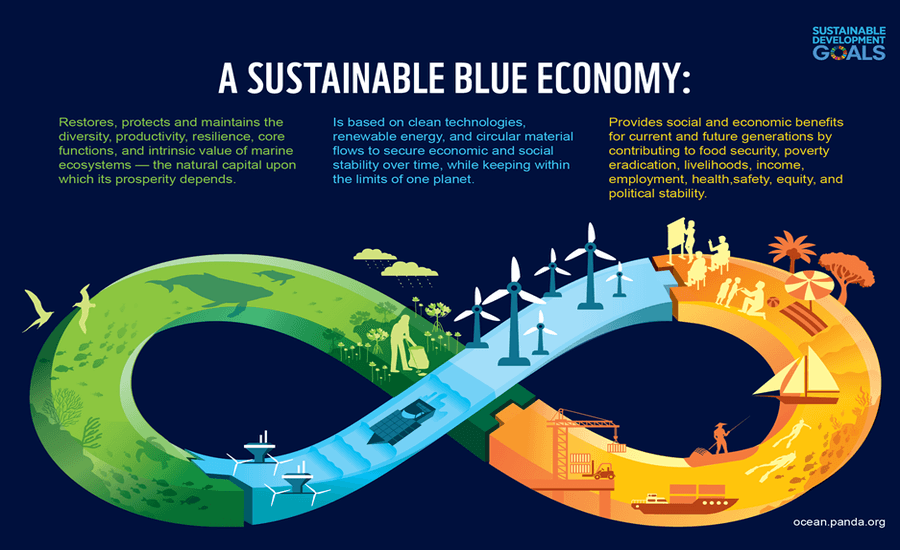Blue Economy: Navigating Sustainable Ocean Resource Use and Marine Conservation
What is Blue Economy ?
The Blue Economy refers to a sustainable and responsible use of ocean resources for economic development. It encompasses various marine-related activities that aim to harness the economic potential of oceans and coastal areas while preserving their health and biodiversity. The concept emphasizes a balance between economic growth, social well-being, and environmental sustainability in the utilization of oceanic resources.

Factors that affect Blue Economy:
Several factors can significantly impact the development and sustainability of the Blue Economy.
Climate Change: Shifts in ocean temperature, sea level rise, and changes in ocean acidity due to climate change can affect marine ecosystems, fisheries, and the overall health of the oceans.
Overfishing: Unsustainable fishing practices, such as overfishing and illegal, unreported, and unregulated (IUU) fishing, can deplete fish stocks, disrupt marine ecosystems, and threaten the livelihoods of those dependent on fisheries.
Pollution: Marine pollution from land-based sources, including plastic waste, oil spills, and agricultural runoff, can have severe consequences for marine life, ecosystems, and human health.
Habitat Destruction: Destructive fishing practices, coastal development, and other human activities can lead to the degradation and loss of critical marine habitats such as coral reefs, mangroves, and seagrasses, impacting biodiversity and ecosystem services.
Lack of Sustainable Practices: The absence of sustainable practices in various marine sectors, such as fisheries, aquaculture, and tourism, can undermine the long-term viability of the Blue Economy.
Technology and Innovation: Advances in technology can either enhance or harm the Blue Economy.
Global Economic Dynamics: Economic factors, including market demand, trade policies, and geopolitical considerations, can influence the profitability and sustainability of marine industries.
Governance and Regulation: The effectiveness of governance structures, regulations, and enforcement mechanisms at local, national, and international levels can impact the success of the Blue Economy. Strong governance is essential for preventing overexploitation and ensuring sustainable practices.
Community Engagement: The involvement of local communities in decision-making processes and resource management practices is vital for the success of the Blue Economy.
International Cooperation: Oceans are interconnected, and issues such as overfishing and pollution often cross national boundaries. Effective international collaboration and agreements are necessary for addressing shared challenges and promoting sustainable practices globally.
Natural Disasters: Coastal areas are vulnerable to natural disasters such as hurricanes, typhoons, and tsunamis.
Cultural Considerations: The cultural values and practices of coastal communities, including indigenous knowledge, can influence how marine resources are utilized.

Need for Blue Economy:
Resource Dependence: A significant portion of the world’s population depends on the oceans for livelihoods, particularly through fisheries and aquaculture. A sustainable approach to utilizing marine resources is essential to support the economic well-being of coastal communities and global food security.
Economic Opportunities: Oceans offer vast economic potential through activities such as fisheries, tourism, shipping, and renewable energy. Developing the Blue Economy can stimulate economic growth, create jobs, and drive innovation in various sectors, contributing to the prosperity of nations.
Biodiversity Conservation: Oceans harbor a diverse array of ecosystems and species, many of which are crucial for maintaining ecological balance. A sustainable Blue Economy seeks to balance economic development with the preservation of marine biodiversity, recognizing the intrinsic value of healthy and resilient ocean ecosystems.
Climate Change Mitigation and Adaptation: Oceans play a crucial role in regulating the Earth’s climate by absorbing carbon dioxide and heat. Sustainable practices in the Blue Economy, such as renewable energy generation and responsible coastal management, contribute to climate change mitigation and adaptation efforts.
Ecosystem Services: Oceans provide essential ecosystem services, including oxygen production, nutrient cycling, and climate regulation. The responsible use of marine resources ensures the continued delivery of these services, benefiting both marine and terrestrial ecosystems.
Innovation and Technology: The Blue Economy encourages the development and application of innovative technologies for sustainable resource management, marine conservation, and renewable energy production. This fosters scientific advancements and technological solutions that benefit various industries and environmental stewardship.
Global Trade and Connectivity: Oceans serve as major transportation routes, facilitating international trade and connectivity. Ensuring the sustainable use of these routes and minimizing the environmental impact of shipping activities is crucial for global economic stability and environmental conservation.
Cultural and Recreational Value: Oceans hold cultural significance for many communities, and marine environments offer recreational opportunities. A sustainable Blue Economy ensures that these values are preserved for present and future generations.
Resilience to Climate Change: Coastal areas are particularly vulnerable to the impacts of climate change, including rising sea levels and extreme weather events. A well-managed Blue Economy can enhance the resilience of coastal communities by incorporating climate-adaptive measures in infrastructure development and land-use planning.
International Cooperation: Oceans are shared resources that transcend national boundaries. The development of a sustainable Blue Economy requires international collaboration to address common challenges, such as overfishing, pollution, and climate change, fostering a spirit of global cooperation for the benefit of the planet.
Sustainable Use of Ocean Resources for Economic Development:
Fisheries Management:
- Implementing sustainable fishing practices to preserve fish stocks and ecosystems.
- The economic benefits of responsible fisheries management and the impacts of overfishing.
Aquaculture Innovation:
- Promoting sustainable aquaculture practices as a viable alternative to traditional fishing.
- Technological innovations in aquaculture and their economic implications.
Renewable Energy from the Sea:
- Harnessing the potential of ocean-based renewable energy sources, such as tidal and wave energy.
- The economic viability and environmental impact of marine energy projects.
Mineral Resources Exploration:
- Balancing the economic potential of deep-sea mining with environmental conservation.
- International regulations and ethical considerations in deep-sea mineral extraction.
Tourism and Recreation:
- Sustainable development of marine tourism to generate economic revenue.
- Strategies for minimizing the environmental impact of coastal and marine tourism.

Balancing Economic Growth with Marine Conservation Efforts:
Marine Protected Areas (MPAs):
- Establishing and managing MPAs to conserve biodiversity and support fisheries.
- The economic and ecological benefits of well-designed and effectively enforced MPAs.
Eco-Friendly Infrastructure Development:
- Designing and constructing coastal infrastructure that minimizes negative impacts on marine ecosystems.
- Case studies on sustainable port development and coastal engineering.
Waste Management and Pollution Control:
- Implementing strategies to control marine pollution and plastic waste.
- The economic cost of marine pollution and the benefits of waste reduction measures.
Climate Change Resilience:
- Developing adaptation strategies for coastal communities vulnerable to climate change.
- The economic implications of climate-resilient infrastructure and community planning.
Stakeholder Collaboration:
- Engaging with local communities, industries, and governments to foster a collaborative approach to sustainable ocean management.
- The role of public-private partnerships in promoting responsible marine practices.
Challenges and Future Directions:
Overcoming Governance Challenges:
- Analyzing the effectiveness of international agreements and governance structures in regulating the Blue Economy.
- The need for improved collaboration and coordination among nations for sustainable ocean management.
Technological Innovation and Research:
- The role of technological advancements in enhancing sustainable practices.
- Investing in research to better understand marine ecosystems and inform conservation efforts.
Conclusion:
The Blue Economy holds immense potential for economic development, but its success relies on a delicate equilibrium between resource use and conservation. By embracing sustainable practices, enforcing effective policies, and fostering global collaboration, societies can unlock the economic benefits of the Blue Economy while ensuring the health and resilience of our oceans for future generations.